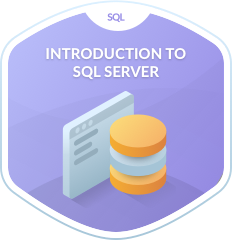Best SQL Server Online Courses - Q2 2023
Our Expert Picks
Time to Complete:
# Enrolled:
Content Coverage:

Lecturer Quality:

Quiz Quality:

Exercise Quality:

Our Expert Review
Content Coverage (5/5)
This course is organized into 4 modules covering the majority of minimal topics for a beginner to intermediate SQL Server course. Each module consists of three to four well-written video lectures, followed by a series of excellent quizzes and exercises to enable the learner to learn by doing. Each lesson is sequenced in a way that helps the learner scaffold their knowledge to more and more complex concepts.
Lecture Quality (5/5)
The video lectures consist of voiceover, screen shares, conceptual graphics, and animations – all of which are very well thought out.
Quiz Quality (5/5)
Datacamp is a unique online learning platform in that it designs its content to be heavily interactive. Each lesson is supported by and aligned with interactive quizzes and exercises that don’t require the learner to download or install software. If you are looking for a learn-by-doing approach, Datacamp is among the best.
Assignment/Excercise Quality (5/5)
As mentioned above, Datacamp intersperses interactive exercises throughout this course. The exercises follow each lecture with hands-on practice, with hints and immediate feedback.
Certificate Branding (4/5)
While not as well known as some online learning platforms, universities, or corporations that offer courses, Datacamp does have a strong brand in the area of Data Analytics.
Time to Complete:
# Enrolled:
Content Coverage:

Lecturer Quality:

Quiz Quality:

Exercise Quality:

Our Expert Review
Content Coverage (5/5)
Taught by Gerry O’Brien, a software developer and Microsoft Certified Trainer on SQL Server, this course is organized into 9 modules, each containing lectures and an online quiz. The course is extremely thorough and contains all of the concepts that our experts consider to be required for a SQL Server beginners course. The course also covers more complex concepts, such as error handling within stored procedures and query performance concepts. The lessons are well-sequenced to allow learners to scaffold concepts gradually.
Lecture Quality (5/5)
The lectures consist of slides, conceptual graphics, animations and screen shares of the instructor actually writing SQL statements and showing the output. The video and audio quality are very high and the lectures are relatively engaging.
Quiz Quality (5/5)
Quizzes comprised of multiple-choice questions end each module and have adequate questions to cover the material within the module. Learners are able to submit each question and receive feedback on the question before moving to the next question in the quiz. If the learner answers the question incorrectly, a link is provided back to the part of the lecture that is covered by the question.
Assignment/Excercise Quality (1/5)
There are no exercises in this course.
Certificate Branding (4/5)
LinkedIn Learning (formerly Lynda learning) is very well known for providing consistently high-quality micro-courses. Certificates can be automatically attached to the learner’s LinkedIn profile.
Time to Complete:
# Enrolled:
Content Coverage:

Lecturer Quality:

Quiz Quality:

Exercise Quality:

Our Expert Review
Content Coverage (5/5)
The scope of this course is quite thorough and includes all of the topics we consider to be important. There are 10 modules, each consisting of short, focused videos and a brief quiz. The sequence of the course is intuitive and builds up concepts nicely. In addition to basic querying concepts, the course does a nice job of covering both basic TSQL (SQL Server’s flavor of SQL), and some of the more advanced administration features of SQL Server, such as backups, restores, and SQL Server security.
Lecture Quality (5/5)
The instructor uses a combination of conceptual graphics, animations, and screen shares to illustrate concepts as he provides clear and well-written audio voice-over. Real-world problems and data are used to explain topics.
Quiz Quality (4/5)
Quizzes are presented consistently at the end of each module, with questions that test the learner’s knowledge of the content covered within that module. The number of questions is somewhat limited though.
Assignment/Exercise Quality (1/5)
There are no assignments or exercises in this course.
Certificate Brand Quality (4/5)
This course is offered by LinkedIn Learning, which has a good reputation in the market for creating consistently high-quality courses. LinkedIn Learning has a wide corporate customer base and the parent company – LinkedIn – is known throughout the world. While not as strong a brand as a major university or corporation, this certificate is likely to be accepted by employers.
Time to Complete:
# Enrolled:
Content Coverage:

Lecturer Quality:

Quiz Quality:

Exercise Quality:

Our Expert Review
Content Coverage (5/5)
This course is comprised of 17 sections, each containing short, focused videos and text-based exercises. The scope of the course is extremely thorough and the topics are covered in a sequence that allows learners to gradually build their knowledge. This is an excellent course for beginners to SQL who want to focus on SQL Server as their RDBMS.
Lecture Quality (5/5)
The video lectures for this course consist of screen shares of the instructor illustrating different ways to code SQL statements and the resulting outputs. The instructor provides voice-over as they code. Where appropriate, the instructor highlights parts of the queries or data to bring certain concepts to focus. Each lesson is well thought out, often using real-world data and examples to help illustrate the concept. The instructor is knowledgeable and confident, and the topics are written in easy-to-understand language.
Quiz Quality (1/5)
There are no quizzes offered for this course
Assignment/Exercise Quality (4.5/5)
Each module contains exercises “labs: that either ask open ended problems or ask the student to perform certain actions. Each exercise comes with a separate answer sheet that contains answers to specific questions or queries that can be used to complete an task from the exercise. There is also an entire module at the end of the course with exercises for learners to test their skills. These exercises are well constructed, but the learner is not required to complete them, nor do they receive any feedback from the instructor.
Certificate Brand Quality (3/5)
This course is offered through Udemy, which is a well-known and respected online learning platform. However, the course is not underwritten by any major university or corporation. As a result, the certificate may not make a strong impression on employers.
Time to Complete:
# Enrolled:
Content Coverage:

Lecturer Quality:

Quiz Quality:

Exercise Quality:

Our Expert Review
Content Coverage (4/5)
This course is organized into 9 modules comprised of several short video lectures and brief quizzes. While the content coverage and sequencing are strong, the amount of time spent on each topic may be too short to adequately learn the concepts.
Lecture Quality (4/5)
Video lectures make up the majority of the course and consist of the instructor speaking over screen shares of SQL code being written and executed. The instructor for this course – Adam Wilbert – is relatively engaging and the lectures are well thought-out. However, most lectures are very short for the complexity of the concepts being taught.
Quiz Quality (5/5)
Each module ends with a quiz comprised of several well-written questions. Learners can submit each question and receive feedback before moving to the next question. If the learner answers the question incorrectly, they are provided with a link back to the lecture that the question covers.
Assignment/Excercise Quality (1/5)
There are no exercises available in this course.
Certificate Branding (4/5)
This course is offered by LinkedIn Learning, which has a good reputation in the market for creating consistently high-quality courses. LinkedIn Learning has a wide corporate customer base and the parent company – LinkedIn – is known throughout the world. While not as strong a brand as a major university or corporation, this certificate is likely to be accepted by employers.
Topics To Look For in a SQL Course
Here goes your text … Select any part of your text to access the formatting toolbar.
- Installing database software (if applicable)
- Understanding the graphical user interface of the database software (if applicable)
- Understanding basic relational database design (relational integrity, data autonomy, low redundancy)
- Creating databases and understanding data types
- Primary, Foreign Keys, Null values, Unique constraint
- Select, Update, and Delete statements
- Filtering criteria (Where, Having, >, <, <>, =, Like, Is null, Not Null, In, Not In, Between)
- Using aliases
- Using subqueries
- Joining tables (Left, Right, Inner, Outer)
- Unions
- Aggregate functions (Sum, Avg, Min, Max, Count, Order By, Group By)
- Working with strings
A Note About Relational Database Management Systems (RDBMS)
The Major Online Learning Platforms
Each online learning platform is unique. Some specialize in certain types of content, some partner with major universities or corporations to develop content, and some have special learning features. While not exhaustive, the list below includes the major online platforms whose courses we feature.
Pros / Cons
Pros: Certificates often are offered from major universities or corporations.
Cons: The quality of course content and features available varies dramatically between courses.
Cost
$$$
Pros / Cons
Pros: Courses are very similar to those offered in colleges.
Cons: The quality of content and features offered varies dramatically between learning programs.
Cost
$$$$
Pros / Cons
Pros: A focus on microlearning with consistently high-quality content. Consistent use of quizzes throughout all courses.
Cons: Pricing is skewed toward annual subscriptions, which is far more content (and cost) than most learners need within a year.
Cost
$$$
Pros / Cons
Pros: Labs offer a means of gaining practical experience in technical skills.
Cons: There are no incremental quizzes or ways to test learners on specific topics.
Cost
$$$$
Pros / Cons
Pros: Udemy tends to be one of the more affordable options for individuals looking to learn specific technical skills.
Cons: Highly inconsistent quality between courses.
Cost
$
Pros / Cons
Pros: Consistent, high-quality micro-content that focuses on practical exercises.
Cons: The catalog is somewhat limited compared to other vendors on this list.
Cost
$$$
Pros / Cons
Pros: Many free online classes are offered. Live online classroom experiences are offered for some of their courses.
Cons: Variable quality of courses, with some courses having relatively low quality.
Cost
$$$$$
Pros / Cons
Pros: Skillshare has a large library of courses related to creative skills.
Cons: Most courses are just a series of lectures with no interactivity, quizzing, or opportunities to practice concepts.
Cost
$$$
For more information, check out our detailed post on the best online course platforms.
Frequently Asked Questions about SQL
Can SQL create web apps?
SQL is a very important part of most web apps. It is the language used to retrieve and update data from a database. Most modern web applications have three layers:
- The User Interface – the web pages that users interact with.
- The Business Logic Tier – this tier captures requests from the User Interface, and manipulates data based on the requirements of the application. The business tier often requests or updates information from or to the database as part of its work.
- The Database – where data is stored.
Which SQL database should you use?
There is no one answer to this question. The major SQL databases include Oracle, Microsoft SQL Server, MySQL, and PostgreSQL. Each has unique features, scaling capabilities, technical requirements, and pricing. MySQL and PostgreSQL are both open source databases, so can be well suited to smaller budgets and early-stage applications. Oracle and Microsoft SQL Server are proprietary applications that provide greater levels of support and – in many cases – better scalability. They are, however, more expensive to license. When making a decision for RDBMS, you should consider what your current needs are and what they might be in 5 years. If you think that you may change databases in the future, be careful not to use the unique features of any given database.
What is the difference between SQL and NoSQL?
NoSQL databases usually store hierarchical documents (usually in JSON format). These documents can be unstructured and can follow schemas that are dramatically different from other documents. NoSQL databases use a variety of querying languages.
Are SQL and MySQL the Same?
No – SQL is a relatively common language used across all relational database management systems (RDBMS). MySQL is the brand name of one of the most popular RDBMS’.
You May Also Be Interested in These Resources
- What is SQL?
- How Long Does it Take to Learn SQL?
- Best SQL Courses for Beginners
- Best Data Analytics Courses
- Best Data Analytics Certifications
- Best Business Statistics Courses



